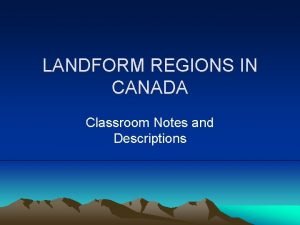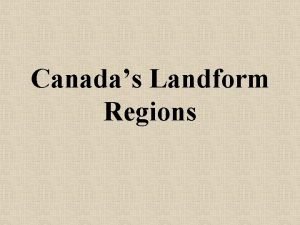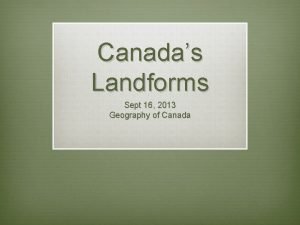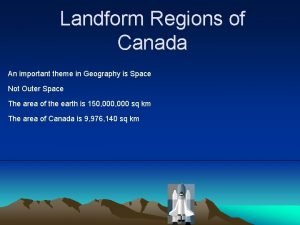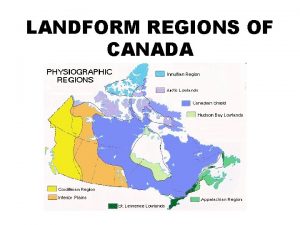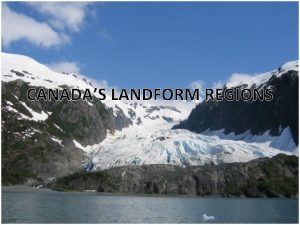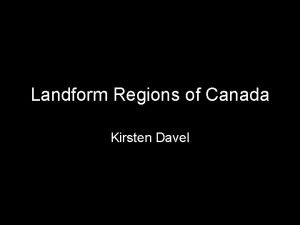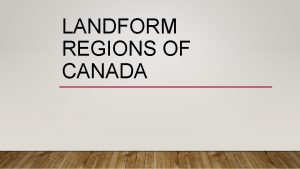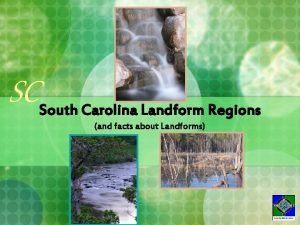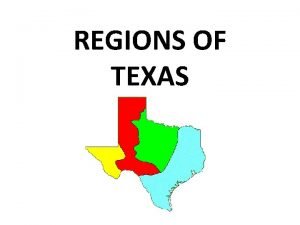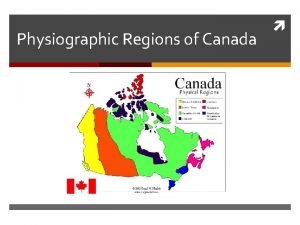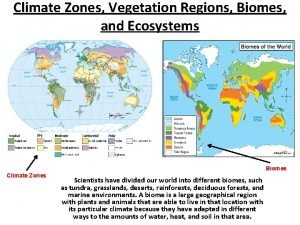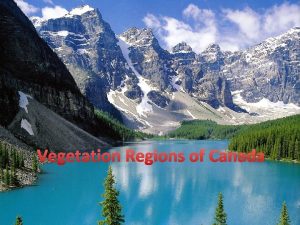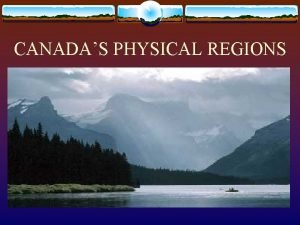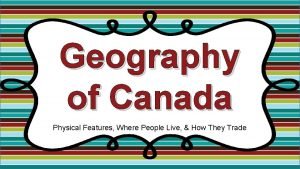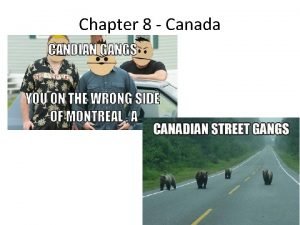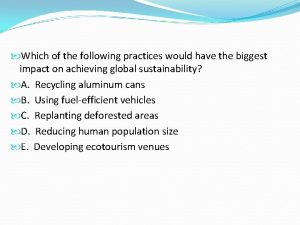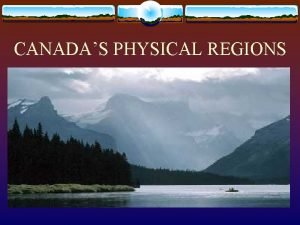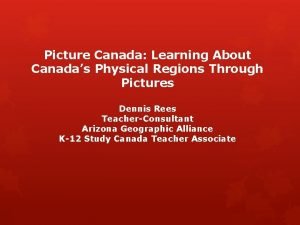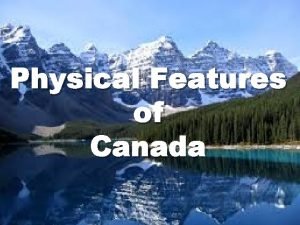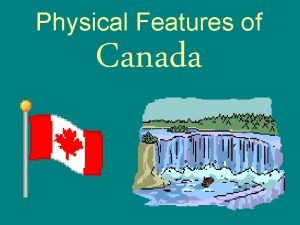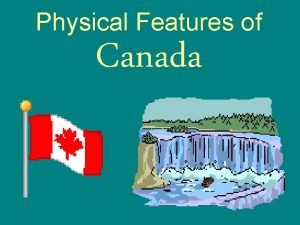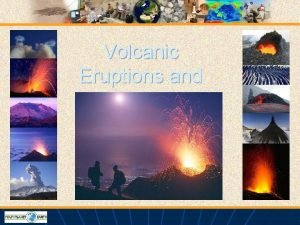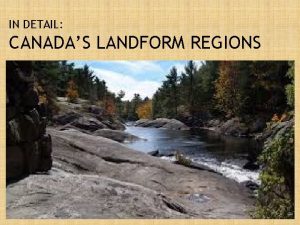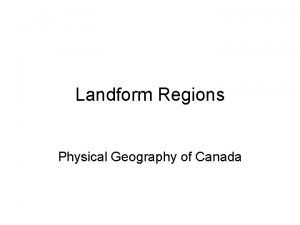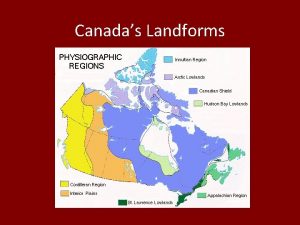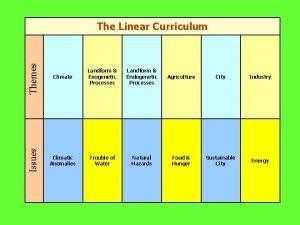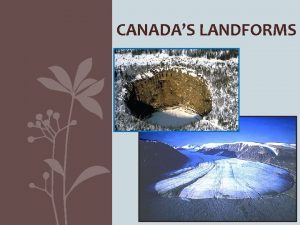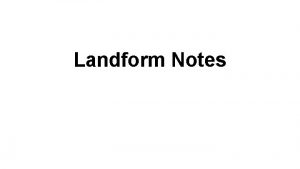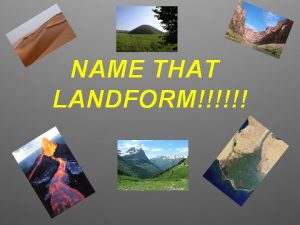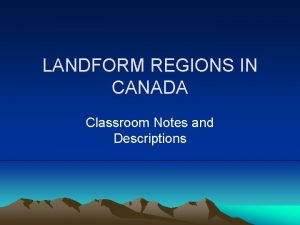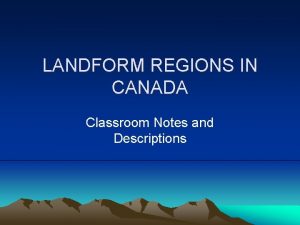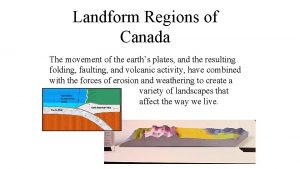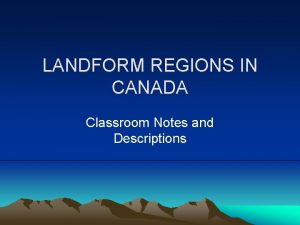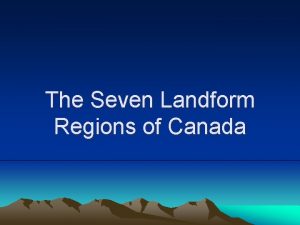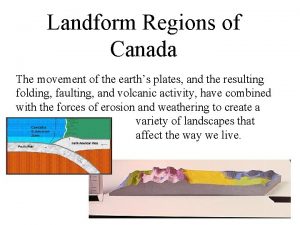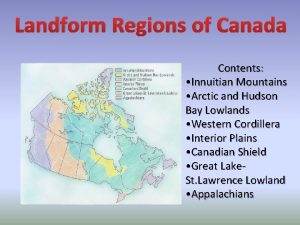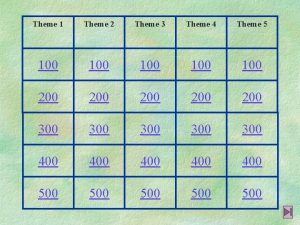Landform Regions of Canada An important theme in

























- Slides: 25

Landform Regions of Canada An important theme in Geography is Space Not Outer Space The area of the earth is 150, 000 sq km The area of Canada is 9, 976, 140 sq km

Land Form Regions In order to help describe the Large space that Canada occupies, Canada has been divided in a number of different way. One way in which Canada has been divided is politically.

Land Form Regions Today we are concerned with “Landform Regions” A landform region is an part of the earth with a unique set of physical features that people often use to meet their needs.

So when we are talking about Land Form regions we are talking about Physical Characteristics. Mushroom cut Cartoon character Shorts

Physical Characteristics Few People Lakes Igneous Rock Christmas Trees (Coniferous Trees)

Land Form Regions of Canada has Seven Land Form Regions Can you think of where these Regions might be located? Hint: Think of the Various Physical Characteristics of the Provinces and Territories

So Why Does Canada have different Physical Characteristics in different Regions? Well… Not all of Canada is the Same age…. The longer the region has been around the longer it has been effected by the forces of Erosion. Older Region = More Erosion

Your Text book compares the growth of Canada to a Tree Trunk growing out from the center. But Canada did not grow Evenly….

The Seven Land Form Regions of Canada are…

The Canadian Shield Characteristics Formed by Volcanoes starting 3 billion years ago. Igneous and Metamorphic Rock Glaciers = Billions of years of Erosion … they scraped Erosion away much of the soil and marked the land with hollows and depressions. This created a land of lakes and swamps some glacial lakes dried up forming clay belts with good soil.

Great-Lakes St. Lawrence Lowlands • A Low Lying Area • Sedimentary Rock which eroded from the Canadian Shield • Rock is about half a billion years old. Glaciers deposited a lot of soil Glaciers scraped out large basins = Great Lakes

<Back> Niagara Escarpment The Niagara Escarpment formed because the escarpment is made of hard Limestone rock surrounded by softer sedimentary stone like Sandstone and Shale. Niagara Falls is an example of the Escarpment.

The Appalachians The mountains of the Appalachian region began to form 250 million years ago Plate movements forced Sedimentary rock to fold upwards Forces of Erosion ground the mountains down to a fraction of their height and the down ocean has eroded the coast line forming many natural harbors.

Interior Plains Wide open area, with no Mountains and few trees. Mostly 200 million year old sedimentary rock Ancient sea beds Glaciers deposited very rich soil

Western Cordillera • Igneous, Metamorphic and Sedimentary rocks • Rocky Mountains • Formed by Volcanos and folding • Interior Plateau

The Innuitians Another Region formed the same way as the Appalachians and the Rockies It is the middle child, older than the Rockies and younger than the child Appalachians. Sedimentary Rock Currently covered by Large Glaciers

Arctic Cold! The coldest day in Canada was at Pelly Bay, Nunavut. The temperature with the wind chill was -91 Celsius. Islands = Sedimentary Rock The land has been scraped bare by moving Ice = Erosion

Now we have examined Physical Characteristics and Climate but how does it effect us?

<Back> Rocks & Resources

<Back> Population

the Canadian Shield Few Major Cities Hydroelectricity Poor Soil, Coniferous Trees Mining

the Great Lakes–St. Lawrence Lowlands Escarpment Large Cities Industrial Heartland

the Appalachians Sedimentary Mountains A few cities over 100’ 000 Many Natural Harbors

Interior Plains Oil and Natural Gas 2 cities nearing 1 million Farming Flat Sedimentary Rock

Western Cordillera Tourism Large population in the Victoria-Vancouver Area Sedimentary Mountains Igneous Mountains
 How were the interior plains formed
How were the interior plains formed Map of canada landform regions
Map of canada landform regions Landform regions of canada map
Landform regions of canada map Major cities in the appalachian region canada
Major cities in the appalachian region canada Whats a landform region
Whats a landform region Landforms in canada
Landforms in canada St lawrence lowlands landforms
St lawrence lowlands landforms Canada landform regions
Canada landform regions South carolina landforms map
South carolina landforms map 4 regions of texas characteristics
4 regions of texas characteristics Canada physiographic regions
Canada physiographic regions Cold ecosystems
Cold ecosystems West coast forest vegetation
West coast forest vegetation Physical regions of canada
Physical regions of canada Canada's physical geography
Canada's physical geography 8 regions of canada
8 regions of canada Traveling southward from the arctic regions of canada
Traveling southward from the arctic regions of canada Physical regions in canada
Physical regions in canada Physical regions in canada
Physical regions in canada Physical features of canada map
Physical features of canada map States that border the great lakes
States that border the great lakes 5 physical features of canada
5 physical features of canada Newspaper article format
Newspaper article format From most important to least important in writing
From most important to least important in writing Least important to most important
Least important to most important Volcanic landform
Volcanic landform
